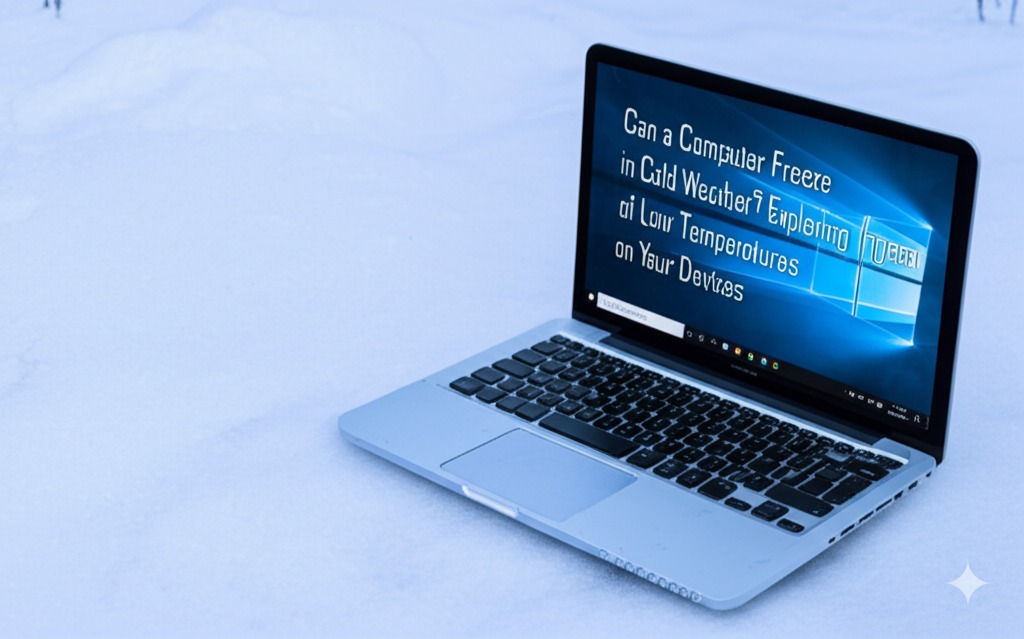When the weather dips below freezing, many people bundle up in thick jackets, scarves, and gloves to stay warm. But have you ever wondered what cold temperatures can do to your computer? Can a computer freeze in cold weather? The short answer is yes, but there are several factors to consider. In this article, we’ll explore the effects of cold weather on computers and how low temperatures might impact their performance and lifespan. Whether you’re worried about your laptop in a chilly office or concerned about your desktop during winter months, read on to learn more about keeping your computer safe from the cold.
How Cold Weather Affects Your Computer
Impact on Internal Components
Your computer’s internal components, including the motherboard, CPU, and hard drive, are designed to operate within a specific temperature range. When exposed to cold temperatures, these parts can experience several issues:
- Condensation: Cold air can cause moisture to form inside the computer. When the device warms up again, this moisture can turn into condensation, potentially damaging internal circuits and causing electrical shorts.
- Slower Performance: Cold temperatures can cause some components to behave sluggishly, especially hard drives. Mechanical hard drives (HDDs), in particular, may have difficulty spinning at optimal speeds when they’re too cold, leading to slower load times.
- Battery Issues: Lithium-ion batteries, which are commonly used in laptops and mobile devices, perform poorly in extreme cold. Their capacity to hold a charge diminishes, and in severe cases, they may stop working entirely.
Operating System and Software Behavior
The operating system and software running on your computer are also affected by low temperatures. Cold environments can cause:
- System Freezes: In extreme cases, the computer’s operating system might fail to function properly due to hardware malfunctions. For example, if the hard drive is struggling to read or write data, you might experience system crashes or freezes.
- Slower Response Times: Programs might take longer to open, and files could take more time to load as the system struggles to cope with low temperatures.
Signs Your Computer May Be Too Cold
Unexpected Shutdowns or Crashes
If your computer suddenly shuts down or crashes, it could be a sign that the temperature is too low for optimal functioning. If you’re using your computer in an environment with temperatures near or below freezing, it’s important to monitor for these signs of distress.
Unusual Noises from the Hard Drive
If you hear grinding or clicking noises from the hard drive, it could indicate that the cold is causing mechanical issues. This is especially true for HDDs, which rely on moving parts. If you notice these sounds, it’s time to move your device to a warmer environment.
Sluggish Performance
If your computer’s performance slows down, it may not necessarily be an issue with the software but rather with the cold temperatures affecting the hardware. You may notice that programs take longer to load or that the device seems unresponsive.
Preventing Damage from Cold Weather
Keep Your Computer in a Warm, Dry Location
To protect your computer from the cold, always store it in a temperature-controlled environment. If you’re using a laptop or mobile device, avoid leaving it in your car or anywhere else where temperatures can drop significantly.
- Room Temperature: The ideal operating temperature for most computers is between 50°F (10°C) and 95°F (35°C). Storing your device in a space that maintains a consistent, moderate temperature will help avoid issues related to cold weather.
- Avoid Sudden Temperature Changes: Moving a computer from a cold environment to a warm one can cause condensation to form inside the device. Let your computer gradually acclimate to the warmer temperature before turning it on.
Use a Laptop Sleeve or Case
If you’re using a laptop, a protective sleeve can help insulate it from the cold. The case can provide an additional layer of protection, ensuring that the device doesn’t get too cold in chilly weather.
Keep Your Computer Powered On
If possible, avoid turning your computer off when you’re in a cold environment. A powered-on device is less likely to experience drastic temperature changes that can cause condensation. Plus, it helps keep the internal components at a more stable temperature.
What Happens if Your Computer Freezes in the Cold?
If your computer freezes or behaves erratically due to cold weather, here are some steps you can take to restore functionality:
- Warm Up the Device Slowly: Bring the computer into a warmer environment and allow it to gradually heat up. Do not attempt to heat it too quickly with external sources like hairdryers or space heaters, as this could cause further damage.
- Check for Moisture: If you suspect condensation has formed inside, leave the device turned off for a few hours to dry out naturally.
- Restart the Computer: Once the device has had time to warm up and dry out, restart it and check for any errors or issues that might have been caused by the cold.
- Backup Your Data: If you notice any strange behavior, make sure to back up your files immediately. Cold temperatures can lead to hardware failure over time, and it’s always better to be prepared.
Conclusion: Protecting Your Computer from Cold Weather
Can a computer freeze in cold weather? Absolutely. Low temperatures can have several adverse effects on your computer, ranging from condensation inside the device to poor performance and even hardware failure. By taking simple precautions, such as storing your computer in a temperature-controlled environment and avoiding sudden temperature changes, you can prevent cold weather from damaging your device.
If you frequently use your computer in cold environments, it’s worth investing in protective accessories like cases or sleeves, which can help insulate your device from the elements. Always keep an eye out for signs that your computer may be struggling with the cold, and take action quickly to prevent long-term damage.
By understanding how cold weather affects your computer, you can ensure that your device stays in optimal condition throughout the year—no matter how low the temperature drops.
Stay prepared, and keep your devices warm and safe!

Caleb Carlson is a contributing writer at Computer Site Engineering, specializing in computer technology, software trends, and hardware innovations. His articles simplify complex tech topics, making them accessible to readers of all levels.





